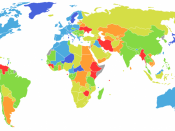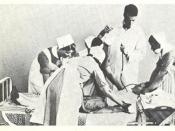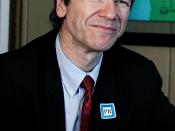Bolivia is one of the many countries which has faced decades of repression. The consequences of tyranny slowly took over in Bolivia, which left the economy (the system of production, distribution, and consumption) unstable. The misguided economy due to overspending was lead into great debt (an obligation to repay a sum of principal plus principal). The economy was spending thirty times more than what it received in taxes. This resulted in a debt crisis which lead to drastic hyperinflation (the increase in the volume of money related to available good and services resulting in a continuing increase in general price levels) , inflation rates which were over 23,500% (www.pbs.org). In Bolivia, prices (value expressed in terms of money) increased at an average of one percent every ten minutes. The economy, as appalling as it was, was so horrid that seven out of every 10 Bolivians lived in poverty.
Bolivia soon adopted 'Shock Therapy'(the sudden release of price and currency control, withdrawal of state subsidiaries, and immediate trade liberalization within a country. Shock therapy's main proponent for many emerging economies was Jeffrey Sachs) and continued with the process taking three steps. With an inflation rate at an all time high of 60,000 percent (www.pbs.org), the only solution to reduce this colossal rate was by putting an end to printing enormous sums of money from the Central Bank (an institution which handles savings and checking accounts, issues loans, and credit and also deals in government and corporate issued securities). This helped stabilize the currency (any kind of coin or paper money used as a medium for exchange) and budget scarcity; the government spent no more than what it had- overspending was put to an end.
Bolivia was rich in oil, a natural resource (a gift of nature) and 'Shock...


